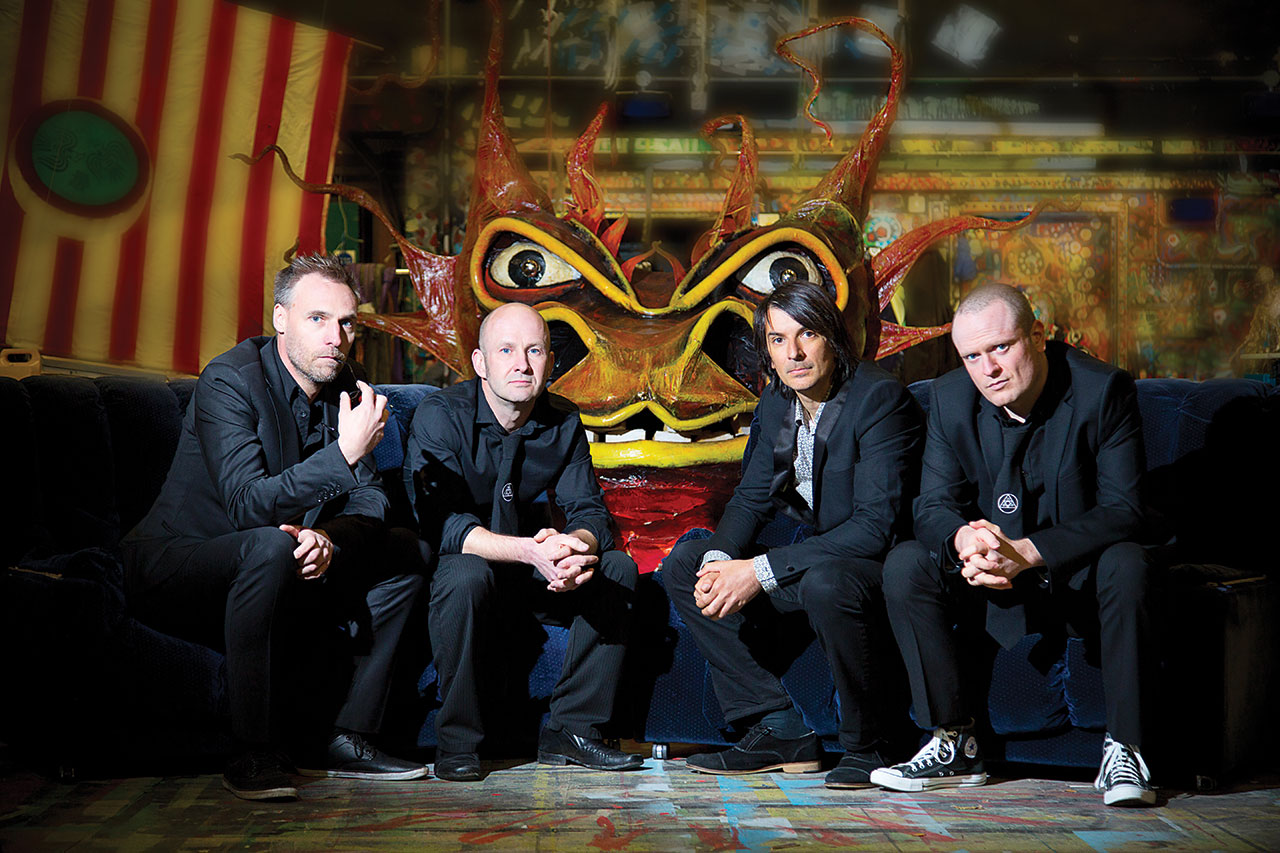Groovus Maximus: Inside Amplifier's trippy sixth album
Recording on tape, running a label and finding inspiration from shamed politicians – it’s all in a day’s work for Amplifier, as they present us with their brilliant new album

Ten years ago, Veronica Lario, the wife of Italian politician Silvio Berlusconi, published an open letter in La Repubblica, the only major Italian newspaper not owned by her partner. Splashed across the front page under the headline ‘My husband owes me a public apology’, it took the ageing philanderer to task for flirting with at least three different women at an awards ceremony, and expressed deep dissatisfaction with his performance as both a husband and a father.
Berlusconi duly apologised, maintaining that he treasured his wife’s dignity “like a priceless gift in my heart” (she would sue for divorce two years later), but the public nature of the humiliation gnawed at him, and he embarked on a Faustian crusade to reestablish his reputation as a paramour. This often consisted of ‘bunga bunga’ parties held at Papa Silvio’s disco chamber, a bolthole carved from the rock beneath his Sardinian mansion, where a mosaic of the sea god Poseidon decorated the floor and the Viagra ran freely.
“Berlusconi’s like a James Bond baddie,” says Amplifier main man Sel Balamir, explaining his fascination with the man who inspired Silvio, taken from his band’s new album Trippin’ With Dr Faustus. “He epitomises the Faustian story. It’s timeless, passed down from generation to generation. You can see that character in any area of life. It’s always a man, and they always get what they deserve.”
If you’re thinking this sounds like perfect concept album fodder you’d be right, but in …Faustus’ case, the truth is a little more humdrum.
“Without wanting to pop the balloon of conceptual mystique,” says Balamir, “it’s not really a concept album. They’re just songs that have gestated and evolved over a certain period. Every period of your life has a different colour and flavour, and this album reflects our lives in the past four or five years: we’re blokes in our 40s and we have sheds. A lot of it is about the moral maze and the conundrums offered by even the most insignificant, minute choices. Like, when you go and buy a can of beans, you’re forced to ask if orphans are dying because you buy them. You’re forced to ask, ‘What are the implications?’”
When you buy those beans, are you thinking, “Aha! There’s a song here!”?
“No, because that would be weird,” says Balamir. “It’s more like the diffuse overall sum of all those cans of beans.”
Sign up below to get the latest from Prog, plus exclusive special offers, direct to your inbox!
We’ve met in a pub in the shadow of Brighton railway station, where a mural featuring some of rock’s dearly departed – Sandy Denny, Jimi Hendrix et al – adorns the exterior, while the very-much-alive Wreckless Eric is soundchecking upstairs.
Balamir has driven in from his home in Worthing, the inspiration for another new track, Horse. “It’s a funny place, Worthing,” he says. “Wherever you go, it smells of weed. People are smoking it in the morning. It’s tempting to think that people move there when they retire, but I think people go there in their 30s or 40s and think, ‘This is awesome! I’m staying!’”
Trippin’ With Dr Faustus is a beast of an album. Amplifier’s trademark huge riffs are in evidence, crunching and churning with malevolent intent. It often sounds like the best of 90s alt-rock – Pixies, Pearl Jam, Jane’s Addiction, Straightjacket Fits – given a lick of psychedelic paint before being tugged and teased into beguilingly ominous, often uplifting new shapes.
The aforementioned Silvio is the unruly cousin of Chicago’s classic 25 Or 6 To 4; Kosmos (Grooves Of Triumph) sounds like Yes, had Yes grown up in 90s Camden rather than 60s Soho; The Commotion (Big Time Party Maker) comes on like Magazine wrestling with Killing Joke; and the panoramic Big Daddy features guest vocals from the treacle-throated Beth Zeppelin.
“Beth’s a Scally bird from Manchester who sings like Tina Turner,” says Balamir. “I met her at a David Bowie tribute gig. She’s a foul-mouthed Janis Joplin character from a council estate and she’s brilliant. She teaches music to little kids, she’s really talented, and she does covers of things like Nutbush City Limits at working men’s clubs. She’s lovely.”
…Faustus is an album that marks a distinct change of approach from its predecessor. Like Beefheart’s Trout Mask Replica, 2014’s Mystoria was the result of months of gruelling rehearsal, followed by the briefest of studio visits, whereas …Faustus is the opposite.
“It came together in dribs and drabs over four years,” explains Balamir. “It’s a record we’ve built.
The luxury of unlimited studio time comes because the band now have their own setup in Manchester, but anyone expecting plush surroundings will be disappointed.
“It’s in an old Victorian workhouse,” says Balamir. “It’s not posh. We were thinking of setting it up as a proper studio, but the plumbing is dodgy and the toilet looks like something out of Trainspotting. It’s alright for us, but if I was a paying customer I would expect not to be electrocuted by the light switches.”

Front and centre sits a battered Otari two-inch tape machine that formerly resided in Rochdale’s Suite 16, a studio once owned by Peter Hook and used by everyone from Joy Division to Lisa Stansfield and Bill Oddie. This ancient machine, which broke down more than once during the sessions, is the key to understanding …Faustus.
“It had to be necromanced again and again,” says Balamir. “It was kind of hairy, but we found another tape machine we could cannibalise for parts. The best thing about the machine – apart from its awesome sound – is ‘rewind’. Once you’ve recorded something, you have to wait for the tape to rewind before you can play your part again, and those 20 seconds are space to meditate. You think about what you’re going to do, or what you just fucked up. It’s not like digital, where you play your part again and again and then pick your favourite.
“Instead, you practise the part and you play it and that’s it. There’s no editing if you make a mistake – you play again. It’s subtle, but it has an impact on the overall execution, as it’s a process of commitment rather than a process of review.
“The other difference is that with 24 tracks, you’re limited to what you can mic up. You can’t have four different mics on the kick drum, you have one. Again, you need to commit.”
When you listen back, can you hear the difference? “What I hear is the space that’s completely missing from most records,” he replies.
Including your own?
“Yes, absolutely including our own.”
Another difference from Mystoria is that …Faustus is released on Balamir’s own label, Rockosmos. Amplifier parted company with their previous label, Superball, after Sony Music swept up its parent company, Century Music. Lines of communication broke down and the band found themselves on their own, without funding. Lesser acts might have called it a day, but Amplifier have been here before. Prog asks Balamir for a potted history.
“I was really happy at Superball,” he says. “It’s just that they got gobbled up by Sony, and as soon as the decision chain becomes transatlantic, it’s hard. Responsibility evaporates, people make choices because they have to, not because they want to, and you can’t have a relationship of trust that works like that. MFN [Music For Nations, Amplifier’s first label] were awesome. I couldn’t wish for a better situation. But it was owned by Zomba, who got eaten. Everyone was rejected, apart from us and Tool. We had to buy our first album back for them, which killed our career at the beginning.
“Then we worked with SPV, which was really great at first, until they demanded another album right now, and when we delivered it, they hated it. So we went from being able to speak to someone on the phone to no one returning our calls. Being on a record label sucked, so we literally fucked off and played in a room for four years. That’s when we made The Octopus and put it out ourselves.
“It was never my intention to jump through so many hoops,” Balamir adds. “In a parallel universe we would have signed to MFN and still be there. It’s tiring… but one thing I can carry into my own label is an understanding of the amount of emotional investment both sides have to contribute to put out a record.”
So now Amplifier have their own label. Balamir works with a label services company who look after international sales and have a digital team, doing all the stuff one man cannot. Ironically, the company were bought by Sony soon after he signed, but so far, so good. “I’ll probably get back to the office to discover that I’ve been bought by Sony,” has says, only half-jokingly.
Next? Amplifier won’t be following the album with an immediate tour, but this has its own advantages. “When we did The Octopus we didn’t tour for six months,” says Balamir, “and I would say that three times as many people came to see us. People knew the record. Also, we have to learn how to play …Faustus, because we never have! What we’re going to do this time is simply ask people what they want us to play. We’ve got a back catalogue of 100 songs so it’ll be really interesting to ask in September to see what people want to hear.”
Balamir is great company. He enthuses about Spotify, Bandcamp, Huey Lewis And The News, the music scene in Sheffield, and about being the guy who runs the label, as well as being the one signed to it. “If I ruled the world,” he adds, “I would insist that no matter who you were, you had to be in a fucking band. Whatever you did. Whatever job. Theresa May? In a band! Do some gigs, make some records, and let that inform your job.”
Trippin’ With Dr Faustus is out now on Rockosmos. See www.amplifierband.com for more information.
Rocking The Cosmos
Sel Balamir on the joys of having his own label
“Releasing records is like a giant art project, says Sel Balamir. “I try not to draw a distinction between the recording and putting it out and the photographs and the conversation that surrounds it.”
After being burnt not once but twice by label deals that went rapidly south, it’s unsurprising that Balamir has launched his own. Rockosmos launched last year with a 12-inch from Sheffield space rockers Awooga, and it’s a home for adventurous music, but the Amplifier man strikes a note of caution, saying, “It’s easy to be eclectic if you have the revenue to make mistakes.”
The current roster includes Awooga (“They’re three Yorkshire rednecks who should be on Red Dwarf, which is where they got the name from, not Kriss Akabusi,” says Balamir) and London proggers Thumpermonkey (“They’re like a puzzle: not just the music, but as you get to know them. They’re very hard to categorise. They’re kind of like the Cardiacs. They become addictive”).
There’s also an album in the works from Sheffield grunge band Dead Blonde Stars, the band who inspired Balamir to start the label. “I’m really excited by them, but I knew no one would sign them,” he says.
What it is about Sheffield?
“The music scene in Sheffield is really fucking happening. You’ll have an unsigned band night, 200 people will be there, and they’ll all know all the words. It’s like what you imagine Seattle was like. It’s really uplifting.”
Are you the guy from Amplifier who runs a label in his spare time, or the guy from Rockosmos who also plays in a band?
“It probably flip flops. I’m the second one at the moment. But Rockosmos offers me a platform to stand on to talk about my own music as well. My band are one of my bands.”
See www.rockosmos.com for more information on the label and its bands.

Online Editor at Louder/Classic Rock magazine since 2014. 39 years in music industry, online for 26. Also bylines for: Metal Hammer, Prog Magazine, The Word Magazine, The Guardian, The New Statesman, Saga, Music365. Former Head of Music at Xfm Radio, A&R at Fiction Records, early blogger, ex-roadie, published author. Once appeared in a Cure video dressed as a cowboy, and thinks any situation can be improved by the introduction of cats. Favourite Serbian trumpeter: Dejan Petrović.
